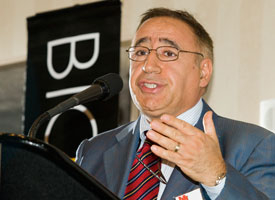Internationally known researcher, educator from ASU to fill spot
Metin Akay has been tasked with leading the University of Houston Cullen College of Engineering’s new Department of Biomedical Engineering.
Akay, officially designated as founding chair at BioHouston’s Breakfast Forum Aug. 21, will use his nearly two decades experience to establish the first new department at the college in more than 35 years.
“The Cullen College of Engineering is uniquely positioned to play a major role in biomedical sciences in the Houston area,” said Joseph W. Tedesco, Elizabeth D. Rockwell Endowed Chair and dean. “We are excited that Metin Akay will be leading our academic and research efforts in biomedical engineering at the University of Houston.”
Currently a professor and former interim chair at Arizona State University’s Harrington Department of Bioengineering, Akay is slated to begin his post at UH next year. At UH, he will carry the title of John S. Dunn Chair in Biomedical Imaging Sciences. The endowed chair position, funded by the John S. Dunn Research Foundation, was created to help lead research initiatives at the university and play a prominent role in the Institute for Biomedical Imaging Science—the research partnership formed by UH, The Methodist Hospital and Weill Cornell Medical College.
At the August event, Akay briefly outlined his plans and shared his eagerness to lead the new department, which the Texas Higher Education Coordinating Board approved in January.
"Recent developments in science, engineering and technology have stimulated interdisciplinary research and collaborations among engineers, physicians, computer scientists and biologists," Akay told a crowd of more than 100 UH faculty, staff, students and area professionals at the UH Hilton. "We are at the midest of these scientific and technological advancements developments. This is an exciting time to be in the biomedical field and I look forward to working with you. We are going to build one of the leading biomedical engineering departments in the world and will play a more active leadership role to promote biomedical engineering education and research at the University of Houston, in Texas, in the U.S. and in the world."
Akay is a native of Turkey who earned his Ph.D. from Rutgers University in 1990. He has spent the bulk of his career climbing the academic ladder to professor, more recently adding the title of interim chair of bioengineering at ASU in 2006, a position he held until March of this year. In January 2010, he will climb further when he begins his post at UH, embracing the challenge of converting the college's longstanding biomedical program into a department.
In his new role, he will work hard to increase the visibility of the department as well as get females and minorities engaged in the field. He anticipates adding as many as 12 faculty in the next five years. This is, as he says, on top of creating a distinguished lecture series and stimulating research collaborations with the world’s most respected medical centers, hospitals and medical schools located just a few miles from UH’s main campus.
On his quest to make the department one of the more respected programs in existence, Akay noted he will “establish a health care focused academic curriculum and entrepreneurship environment to meet the demands and requirements of the ever-changing global economy that influences health care technology, management and delivery.”
He plans to develop new academic and research fields that include biomedical imaging, neural and cognitive engineering and genomics and proteomics science and engineering. Garnering major emphasis in these areas will be cellular and cancer biomarker imaging, therapy assessment, intelligent drug design and delivery, neural implants, neurochips and neural signal process and modeling.
Beyond this, plans are also underway to enhance the program’s offerings with a Ph.D. option in addition to existing bachelor’s and master’s degree tracks. Pending approval from the Texas Higher Education Coordinating Board, the doctoral degree could be available as early as fall 2010.
| AT A GLANCE — Metin Akay | ||
|---|---|---|
| Education | Bachelor of Science and Master of Science in electrical engineering from Bogazici University in Turkey and a Ph.D. in biomedical engineering from Rutgers University. | |
| Career | Akay has worked in both academia and industry. Early on in his close to 20-year career, he spent time as a consultant for MedAcoustics Inc. and UMDNJ. He went on to serve engineering and computer science departments at Rutgers, Dartmouth College and Arizona State University. He earned the title of full professor in 2005. | |
| Research | He has researched and published extensively in the areas of neural engineering, biomedical informatics and biomedical imaging. | |
| Honors | Akay has earned several honors throughout his career. Among these are two Young Investigator Awards from Sigma Xi, the IEEE Third Millennium Medal in Biomedical Engineering, the IEEE EMBS Service Award and an IEEE Early Career Achievement Award. He is also a fellow of IEEE and the Institute of Physics. | |
| Service | Devoted to promoting bioengineering, biotechnology and biomedical engineering, Akay has given more than 50 keynote and plenary talks at international and national conferences in areas of neural engineering, rehabilitation engineering, computational biology and bioinformatics. This is in addition to work as editor-in-chief for bioengineering and biomedical engineering books and as associate editor or chair of steering committees for journals in these areas. | |
